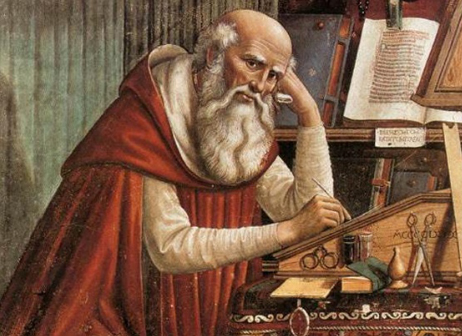This blog seeks to reopen the debates of Early Christianity about the principles: The Father, The Son, and the Holy Spirit. It seeks to understand what was meant by the Logos and the Paraclete. I stumbled upon a blog that was perfect for this journey. The following is quoted from Mieke Mosmuller’s philosophical reflections blog. 
“In the book ‘Contra Faustum’ Augustine writes as follows and we can see clearly, what Rudolf Steiner meant:
Faustus objects to the incarnation of God on the ground that the evangelists are at variance with each other, and that incarnation is unsuitable to deity. Augustine attempts to remove the critical and theological difficulties.
1. Faustus said: Do I believe in the incarnation? For my part, this is the very thing I long tried to persuade myself of, that God was born; but the discrepancy in the genealogies of Luke and Matthew stumbled me, as I knew not which to follow. For I thought it might happen that, from not being omniscient, I might take the true for false, and the false for true. So, in despair of settling this dispute, I betook myself to Mark and John, two authorities still, and evangelists as much as the others. I approved with good reason of the beginning of Mark and John, for they have nothing of David, or Mary, or Joseph. John says, “In the beginning was the Word, and the Word was with God, and the Word was God,” meaning Christ. Mark says, “The gospel of Jesus Christ, the Son of God,” as if correcting Matthew, who calls him the Son of David. Perhaps, however, the Jesus of Matthew is a different person from the Jesus of Mark. This is my reason for not believing in the birth of Christ.
Remove this difficulty, if you can, by harmonizing the accounts, and I am ready to yield. In any case, however, it is hardly consistent to believe that God, the God of Christians, was born from the womb.
2. Augustine replied: Had you read the Gospel with care, and inquired into those places where you found opposition, instead of rashly condemning them, you would have seen that the recognition of the authority of the evangelists by so many learned men all over the world, in spite of this most obvious discrepancy, proves that there is more in it than appears at first sight. Any one can see, as well as you, that the ancestors of Christ in Matthew and Luke are different; while Joseph appears in both, at the end in Matthew and at the beginning in Luke. Joseph, it is plain, might be called the father of Christ, on account of his being in a certain sense the husband of the mother of Christ; and so his name, as the male representative, appears at the beginning or end of the genealogies. Any one can see as well as you that Joseph has one father in Matthew and another in Luke, and so with the grandfather and with all the rest up to David. Did all the able and learned men, not many Latin writers certainly, but innumerable Greek, who have examined most attentively the sacred Scriptures, overlook this manifest difference? Of course they saw it. No one can help seeing it. But with a due regard to the high authority of Scripture, they believed that there was something here which would be given to those that ask, and denied to those that snarl; would be found by those that seek, and taken away from those that criticise; would be open to those that knock, and shut against those that contradict. They asked, sought, and knocked; they received, found, and entered in.”
This quote shows the great debates within early Christianity. Those with ties to the Old Mysteries that persisted until the 4th Century, sought for the Cosmic Christ and could not accept that a divine being would, or even could, incarnate into matter. The physical world had evolved from being maya, illusion, to be the creation of a lesser-god that, through temptation, had corrupted Mankind. But the New Mysteries, established on Golgotha, declared that this God, the Christ, had indeed fully incarnated into a physical body and, by doing so, had altered the future path of Mankind and the Earth. But the forces promoting a physical Christ, could not figure out the birth of Christ. The mysteries of the Baptism and the Transfiguration were already lost. Gone too, by the time of Augustine, was the understanding of the different between Jesus and Christ. Grasping this difference made the birth stories of Matthew and Luke understandable. For the four Gospels, are not contradicting each other. The Birth of Christ is at the Baptism. Now this paper about Leonardo’s Virgin of the Rocks will make more sense.